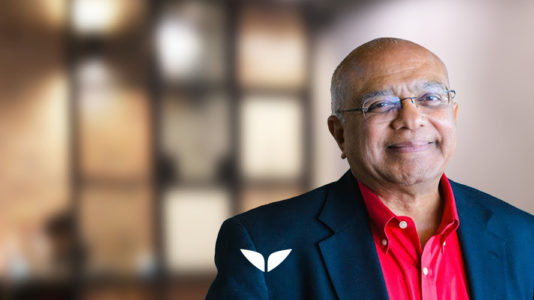Vishen: Hi. I am Vishen Lakhiani, Founder of Mindvalley, the school for human transformation. You’re listening to the “Mindvalley Podcast,” where we’ll be bringing you the greatest teachers and thought leaders on the planet to discuss the world’s most powerful ideas and personal growth for mind, body, spirit, and work.
Welcome to this episode of the “Mindvalley Podcast.” Now, folks, I’d love bringing to you guys fascinating men and women that I encounter around the world. And what I mean by fascinating is that these people are doing things that regular human beings do not do. They have created incredible success in some area of their life. But more than that, they’re consciously competent, they can explain, they can turn into a system the very tools, mindsets and habits that make them successful and then effectively teach other people.
This is in essence what makes a great a teacher here at Mindvalley, someone who has incredible results, that knows how to teach you how to replicate it. Now, when I think of great teachers, one name that consistently comes to mind is Eric Edmeades. Eric is an incredible entrepreneur, he created one of the world’s top special effects company to work on Hollywood blockbusters like “Ironman, Avatar, The Pirates of the Caribbean,” and his stories, just working in the industry are incredibly beautiful and fun and mind-blowing. But more than that, Eric left that industry to become a teacher. He decided that he wanted to live a life where he got to become his best self and teach other people how to do it. So, one of the first things he taught himself how to do was put his body into really powerful states of existence, for example, Eric climbs Mount Kilimanjaro while fasting. And he did this by living and studying with the Bushmen in Africa. Now, that was just one little thing he did.
Another thing he did was he taught himself to become one of the world’s greatest teachers on stage to the point that Tony Robins put him on stage, and then he started a seminar, teaching people how to speak on stage. Now, we work with Eric on both of these events, his nutrition program that came from his time with the bushmen is called “WildFit,” I’ve been in it, completely changed my life. And at Mindvalley, Eric teaches the art of how to master the stage effect. Now, in this talk, you’re gonna see his brilliance in commanding the stage. This particular talk is called “Mastering your state of being” and it’s about an idea he calls the “The Hindsight Window.” It’s that window, that gap between us making a mistake and us gaining an insight from that mistake. Now, it sounds simple, right? But wait till you hear how Eric teaches you how to fully master your being by recognizing the power of hindsight. Let’s get started with Eric Edmeades.
I am Vishen Lakhiani and this is the “Mindvalley Podcast.”
Eric: When they ask me to come up and share something new with you guys, I thought what I would do is share something I’ve been working on for a long time and I want to share a talk with you that I believe that you will remember forever. I know that seems like a pretty big claim, but I think it’s really foundational stuff and that is something that I’ve been developing called “The Hindsight Window.” And the hindsight window is the window of time between an event which you perceive to be bad at the time and the time sometime in the future that you see it as a symphony, that you see it as something that was meant to be, you see it as something you’re grateful for. So, you got fired and you were angry and then later you go, “Of course, that was meant to happen,” right? How many of you have had this experience? Okay. We call that “The Hindsight Window.” And here’s kind of my general idea, it strikes me that the longer your hindsight window, the less you’re happy, and the shorter your hindsight window the happier you’ll be. Does this make sense?
Together: Yes.
Eric: So, my father, for example, very often has a long hindsight window on stuff that happened to him 30 years ago. The window is still open and so that stuff can come up for him, right? And so, if you have this long hindsight window, then it’s harder to achieve present-day happiness and if you can have a short hindsight window, then you can have more. In fact, here’s an emotional formula for you, resentment, regret in the past equals fear in the future. However much resentment and regret you have about your past, will show up for you as fear of your future. But the opposite of this is however much gratitude you have for your past, will show up as faith in your future. And so, we need to clean up our past so that we can look out into the future because by the way if you’re hanging on to some notion of certainty about your future that everything you want to do is going to work out the way you want to do it, Jim Rohn said it best, “If you picked up a book and you read chapter one and everything was all right, and then you picked up the book and read chapter two and everything was all right, you wouldn’t read chapter three. You picked up the book for drama, you came into this living here for drama, you just did.” And so, what we want to do is figure out how do we write that drama best, how do we learn from and grow from the best?
So there’s the past present and the future. And if you think about it, the past, the present, or the future, which one do you think is easiest to clean up? Which one is hardest how about? Actually, it’s the present. I’m gonna kind of give you an example of this, you see, when you know something’s gonna be traumatic in the future, you can solve it beforehand. I used to do road rage. Does anybody do road rage? A little road rage here and there. Here’s me doing road rage, I got my new little convertible. I was driving along in London on a beautiful sunny day, is anybody here from England? You probably remember that day? And so, I’m sitting in my little convertible and I just bought it and I’m so proud of myself in this big…for those of you here in England maybe Australia, you guys know white van man. For those you don’t know white van man is a Neanderthal, he’s like 99% Neanderthal and he drives a big van and it has no company names on it and so he drives around obnoxiously and there’s hundreds of thousands of them.
And white van man pulls up beside me and I’m in my little convertible, and I can feel him staring at me. I can feel him staring at me and I know he wants me to look at him, and then when I look at him, he’s going to say, “What are you…” What’s he gonna say? “What are you looking at?” He’s just, he’s a bully. And so, I’m not gonna do it, I’m having fun, I got the music on, I’m not…What the hell am I doing? I look and true to form, he knows his lines he goes, “What are you looking at?” And at this point I’m like I don’t want to say anything, a red light, I’m trapped here, I don’t wanna say but my mouth has other plans. My mouth says, “The ugliest bugger I’ve seen all day.” What are you doing? It’s suicide by mouth. This guy, by the way, his head was this wide, his mother didn’t give birth to him, she found him in a glacier and she thought him. I like, “He’s a huge guy, I’m terrified.” I have adrenaline coursing through me and he sucks his head in through the window to talk to his brother for a second and then he sticks his head back out the window to talk to me. Now, I can’t do cockney so I’m going to do Southern American. He says to me, “My brother says your daddy probably bought you that car,” and I said, “I’ll bet your brother is your daddy.”
The light turns green and I’m gone, right? Gone. And it’s funny, but I felt like crap all day, the adrenaline from the fear of it. You know, in a couple of weeks later, I’m driving my friend’s BMW Z8. For those you don’t know the Z8, that’s what happens when you mate a Harley Davidson with a Ferrari. It’s a really fun car to drive with all the rumbling and I’m driving this car and I’m in Vancouver, I pull up to a red light and I suddenly realize I’m in the wrong lane, I pulled into the wrong lane. And I’m kind of straddling these lanes and a bus pulls up beside me and four cute girls come walking down the sidewalk and they cross the road in front of me and they must have timed this because all four of them go, “Nice car, dude.” And I’m like sitting there going like, “That’s right.” Because when you’re in your friend’s car and somebody says, “Nice car, dude,” it’s your car. And I’m in there and then the bus driver, he’s over here and he goes, “Too bad you can’t drive.”
And then I’m like, “Yeah. Well, if I could drive any better, I’d be a bus driver.” Only I didn’t say it. Because it’s funny as hell and a lot of our humor unfortunately in the western world is funny at somebody else’s expense and had I said that to him, who knows, but it could have been soul destroying, condescending and I didn’t say it. And the reason I didn’t say it, is I stopped doing road rage. And the reason I stopped doing road rage is I figured out life hacks and the life hack was very simple, I lived in England. England is all about football. And so I took a red and a yellow card and I put them in my visor and I drove around realizing I was no longer gonna do road rage. I wasn’t gonna do that anymore, I was gonna become the traffic referee.
That’s my new plan, the traffic referee. And so, what did I do, I would drive around and look for incidents. And the funny thing as soon as I had the red and yellow card up there, nobody cut me off anymore, it was the weirdest thing. And then finally one day this guy cuts me off and I’m like, “Red or yellow?” And I’m like, “Let it go. Let the game go on.” I could never have let it go before. No. I had to let him know he was wrong. I didn’t know that he needed to say sorry and, you know, and by the way you can try every finger gesture in the world and every arm gesture in the world, does anybody ever say sorry? No. They don’t say sorry.
Then one day I’m driving along and a guy does a U-turn right in front of me, right in front of me, 30 miles an hour 50K, does a U-turn right in front of me but there’s no space in the other lane so he ends up stopping in front of me and I end up having to slam on my brakes. Is this a red or yellow card offense? It’s a red card offense, truth. Grabbed the red card, I had my convertible set up high, “Red card!” He busted out laughing. He knew he was wrong. Everyone else busted out laughing. And then he apologized to me. For the first time ever, I’d ever seen anybody apologize in traffic like that, he did. And what happened is that my whole day was improved, his whole day was improved and all the people who watched, their day was improved. I had life-hacked road rage.
So, we can do that. We can clean up our past before it happens. We can stop that stuff when we know. When we know we have a habit, we can figure out the hack and break it. But what do we do when it’s in the moment, or what do we do when it’s in the past? You know, so, I was working with this woman, she had self-esteem issues, the reason she had self-esteem issues is that her mother had abandoned her when she was three. That’s, by the way, not the reason she had self-esteem issues, it’s the triggering event. The reason is because it’s a meaning she assessed when she was three. Because, by the way, when you’re three and you create meanings like we saw in the talk earlier today, you’ve set up your rules for life by the time you’re nine.
When you create a meaning at the age of five about what’s going on around you, how much life experience did you have? None. No, not even five because your cognitive memory kicks in at three. You’ve been a human for about 20, I mean, in mental cognitive terms for about 24 months, then something happens and you go, “Oh, that means that for the rest of my life.” That’s what happens, right? And so, this woman, what meanings did she create? My mother left because I’m not worthy, I’m not capable of being loved, I’m not a valuable human being. Does this sound familiar to anybody?
And so, I asked her to go into the memory and tell me what happened. She got so upset. She’s in there, she’s like, “I was on the bed and I was crying, and my mom was packing up and she was crying and then she left and I cried even more, it was awful.” And she descended right into it. And I said, “Okay. Now, stop. Come back to me.” I said, now and she used to be a professional sports person, so I said, “Here’s what I’d like you to do. I’d like you to give me the play by play and the color, right? The play by play is what’s happening in the field and the color is the background, you know.” “Well, Jim, they’re moving down the field. Well, that’s the fourth time he’s moved down the field. Are you with me?”
So, I said, “I want you to give me the play by play and the color of what’s going in the room. So, step out of the memory.” And she goes, “Oh, Okay.” She goes, “Well, there’s a baby sitting on the bed, Jim, and the mother is packing up her clothes over here, they’re both crying a lot. Why are they crying?” I said, “Well, the background here is she’s leaving and the baby know she’s leaving and everybody is upset by that.” And I said, “Why is she leaving?” “She’s leaving because she’s sick,” she said. “She’s leaving because only earlier that week she had gone shopping and forgotten the baby in the house for four hours on its own and she realized she was sick and she loved the baby so much, she was doing the only thing that she could do to keep the baby safe and that was to leave.” And as soon as she said those words, she burst into tears and she started crying because she had just cleaned up the past.
It is never too late to have a happy childhood. We just have to go back and remember it differently. We have to go back and remember the truth of what happened, not the truth of what we believed happened at the time. Does this make sense? Okay. So, now it’s fine. We know how to do in the future, we know how to clean up the past. The toughest one is the present, isn’t it? “You’re fired,” handle it right that moment how about, right? So, I’m gonna give you an example of how I handled in the present. How many of you are familiar with Viktor Frankl? If you are not, please read “Man’s Search for Meaning.” I read the book every two years, it’s a hard book to read.
Viktor Frankl was a Jewish psychotherapist dealing with what he called logotherapy which was meaning based therapy. He basically believed that if you could have somebody assess the correct meaning for an event, they could clean anything up. And he had finished his book and he had his manuscript on his hand, and then he found himself on a train to Auschwitz. And his life as he knew it was over, and in that moment, he thought, “You know what? I have an opportunity here. I have an opportunity to prove my life’s work by going to the concentration camps.” And his book is fascinating. It’s difficult to read, so the way I read it by the way, this is my formula, if you want to read it the way I read it, you get it as an audiobook and you go to Whistler BC, although any skill here will work. You read the book as an audiobook on the chairlift going up and then you listen to Led Zeppelin going down. It works very nicely.
Now, I’ve been working on this book “The Hindsight Window” and one day, my wife and I arrived home, we’ve been on the road for six months, six months we had not been home. We had everything we owned pretty much of value with us, all the computers. I had just been in the bush with the hides of Bushman for a week with all original footage that was not yet on the cloud. I had all original photography from some time that I spent with wild chimpanzees in Mohali. We had $45,000 worth of stuff with us. Now, the reason I know that is because as soon as we arrived home, somebody stole all of it. Passports, money, cameras, everything gone. We went in shopping, we left the driver to take care of the car and instead of taking care of the car he texted his friends and he told them to come and clear out the car. Six months on the road giving, six months on the road working with people, six months on the road of creating all kinds of miracles around the world and this is our repayment? That’s how I’m feeling, right?
And so, here’s what’s going on. I open the back of the truck, the stuff is gone. I am heartbroken, it’s gone. First, there’s denial, “He moved it. He must have moved the stuff.” Then there’s reality, “He didn’t move it.” Now, we’ve heard a few people today talk about changing your eyes to change your stress levels. One of the first things you do when you become afraid is you look intently at stuff and focus. If you’re afraid of public speaking, sometimes it’s because you’re focusing rather than having a cast out view of the entire audience. When you open your eyes into a relaxed state, you become more relaxed. In that moment it’s difficult to do that because the stuff’s missing and you’re looking for clues and I’m angry and I’m frustrated, and I’m pissed off. It’s all gone and my wife crying her eyes out, that pissed me off. Now, I’m angry. But is anger gonna help? No. Anger is not gonna help at all.
The next two weeks of our life are ruined, I’m angry, I’ve got adrenaline coursing through my system, she’s crying. And I have to ask myself, is anger helping? And I realize it isn’t. And I thought to myself, “Okay. But what would help?” And I said, “Calm.” But calm was not available to me. It was not an available emotion in the App Store, I couldn’t get it. And so, I started asking a new question. I asked, I suddenly realized the Viktor Frankl thing, if he’s on a train with his book about meaning and he’s on his way to Auschwitz and he can reconcile with that, surely, I can reconcile with this. And so I start thinking to myself, “All right. I have actually zero regrets. I have no regrets, no anger, no resentments about my past, none.” And I had a tough childhood. I had to call the police once to break up a fight between my mom and my dad over a knife. You know, I had a tough childhood, I’m grateful for it. I was homeless at 15 years old in Edmonton, Alberta in the winter. I would like to tell you that that means minus 40 and for those of you who are Americans, it’s the same. Minus 40 is minus 40 in both, it’s cold. But I don’t have any anger or resentment about that.
So, I looked at this event and I thought, “Well, you know what? I know that one day I’m gonna feel grateful for this. One day, I am. Why might I, why might I one day be grateful for this event, why might I? And I started thinking, “Okay. Well, you can’t come up with anything. No, come on. Why might you be grateful for this one day? Well, to be fair, you at least could use two weeks without work, distraction, what have you? So, without laptops, you’re gonna have two weeks of nothing. So, you’re gonna have a lot of time together and I thought, “That’s pretty cool. That’s pretty cool.” And also, my phone was gone and I’ve been thinking about living without a phone which by the way as a result of this I ended up living without a cell phone for six and a half months, wrote an 80,000-word book and had the single most six-month, productive six months of my life, that’s a whole another talk for another day. Six and a half months without a phone and the only reason I bought one is my wife got pregnant, and then I had to have a phone, fair enough.
So, I started thinking, “Okay. Then I’m gonna to try my no-phone experiment. I don’t have a laptop, plus I told my wife when I sold my last business that we’re going to take on this huge shopping spree. I told her $15,000 of anything you want, clothes, all of it, just whatever you want. She hates shopping for clothes, we’ve never done it. Now she has no choice. Plus, she has a three-and-a-half-year-old Mac and I’m her IT director which means I’m the one fixing everything all the time. I find, and she won’t let me buy her a new Mac. Now, I get to buy a new Mac, while I’m at it, I get to buy myself a new Mac. I am not kidding you, I’m still standing there with the door open looking at the empty truck and I started feeling good about this theft. And I had a longer list, I just kept coming up with reasons that this theft was a massive gift in my life. And I’m like, “This is incredible. And I turn around, I put my hand on my wife’s shoulders, and men, by the way, if you would like to know what women really want to know from you, what they really want to know above all, is that everything is gonna be okay.
And so, I turned, and I put my hands on her shoulders and I looked her deep in the eyes and I said, “Listen, I’m telling you, everything is gonna be okay.” And she looks at me she goes, “How?” and I said, “This is gonna be hard for you to understand at this moment because you have all the adrenaline in your system. But I’m telling you, look at me right now, do I look angry?” She goes, “No.” “Do I look upset?” “No.” “I’m excited.” She goes, “You’re excited, why?” And I go, “Laptop’s, this, that. Plus, you and I are gonna have two weeks with no electronic distractions. We’re going to have a ton of fun, we’re going to have great sex, walks on the beach. It’s gonna be the best two weeks of our lives. She’s like, “Cool.” And I want to tell you something, it was. The next two weeks were fabulous, and it would put me in a position where, by the way, I was the one editing all the surveillance video for the police. I was directing the investigation because when you are rational, people listen to you. When you’re all anger based, they don’t. So, here’s how it works, event happens, you figure out the emotion you’re having and you decide, is it serving you? Then you say, “What emotion would be serving me better?” And then you ask yourself, “What would have to happen for me to find gratitude right now?” The more gratitude you can find for your past, the more faith you will have in your future. Thank you, guys, so very much. It’s been an honor and privilege to be here with you. Thank you. Thank you all.
Vishen: I hope you enjoyed that talk and it was given at A-Fest, Mexico in 2016. People absolutely loved it. Now, you can learn more about Eric by going to the A-Fest YouTube channel, tons of talks from him all up there, on our YouTube channel. But you can also look into WildFit, which is Eric’s program with Mindvalley. It’s an incredible program and it’s all about changing your relationship with food. Hope you enjoyed the conversation with Eric Edmeades, I’ll talk to you soon.




